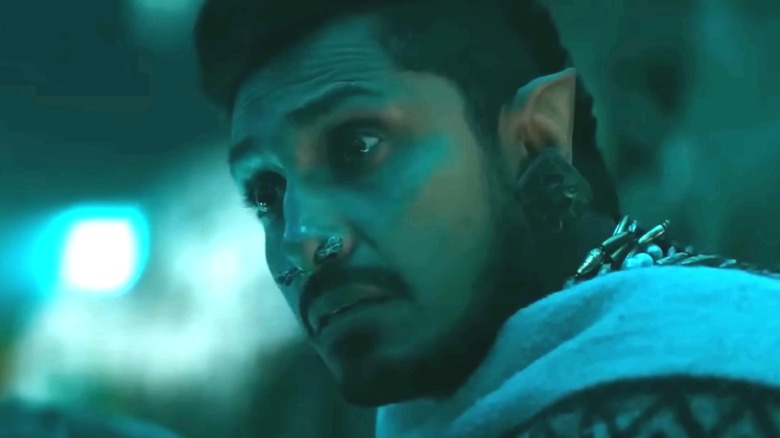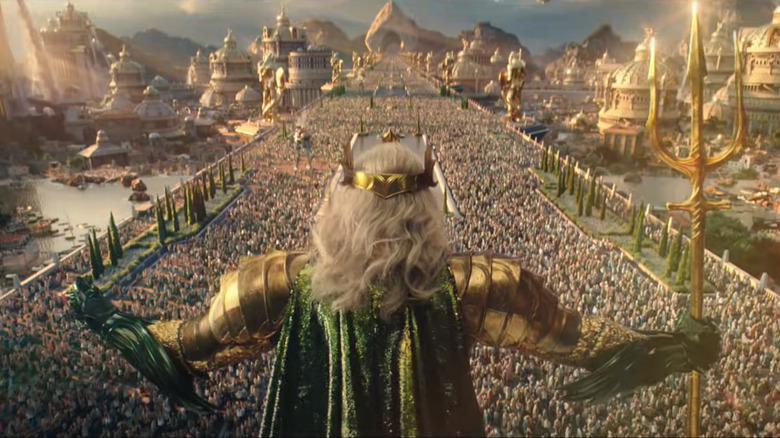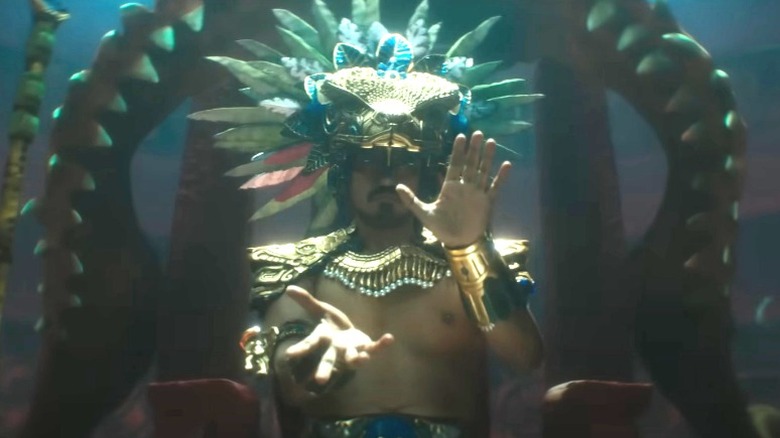Why Isn't Atlantis In Black Panther: Wakanda Forever?
Namor the Submariner has been a staple in Marvel Comics since 1939, but it's taken the water-dwelling anti-hero over 80 years to make his silver screen debut. Fortunately, "Black Panther: Wakanda Forever" finally brings the character into the Marvel Cinematic Universe fold, brought to life by actor Tenoch Huerta. While it's a massive win for comic fans to see Namor finally make a grand live-action appearance, some will no doubt be surprised to find that this new iteration of the character sports a key backstory difference from past depictions.
Many comic book fans are familiar with Namor as a ruler of the underwater city of Atlantis, but that's not the case in "Black Panther: Wakanda Forever." In fact, Atlantis as a whole is nowhere to be seen — or even referenced — in the film. Instead, Namor and his people hail from a similarly-submerged civilization called Talokan. It's a curious change, but the team behind the movie had some strong reasons for why they decided not to depict Atlantis.
Atlantis has been done before
As history buffs might tell you, depictions of Atlantis extend far beyond Namor, appearing in all manner of books, films, and TV shows in the years since Plato first mentioned the city centuries ago. According to "Black Panther: Wakanda Forever" director Ryan Coogler, the team wanted to avoid retreading the same ground covered by other Atlantis-centric narratives. "We wanted our film to exist alongside those movies and be different," Coogler told Inverse. "It was really out of respect to the audience, not wanting to give them something similar to other things that have come before it."
Notably, there have also been rumors that Marvel Studios is not legally allowed to use Atlantis in a live-action setting with Namor, though no verifiable evidence of this claim is readily available. It's possible that such an idea was born out of a misunderstanding regarding Marvel Studios' ability to use Namor in a movie at all, as the character's film rights were previously tangled between several studios, including Universal Pictures (via IGN).
One piece of speculation that may hold more water has to do with DC Comics' Aquaman, a historic superhero who has often been compared to Marvel's Namor. Both Aquaman and Namor typically hail from Atlantis in the comics. However, with DC's aquatic mascot amassing more mainstream popularity thanks to Jason Momoa's Aquaman appearing in flicks like "Justice League," it's possible that the "Black Panther: Wakanda Forever" team changed Namor's origin to reduce similarities between the two.
The team felt the change was good for representation
Beyond the "Black Panther: Wakanda Forever" team's desire to do something different with the concept of an underwater civilization, there appears to be another reason why Atlantis isn't featured in the movie. Several people involved in the film production, including Tenoch Huerta and Ryan Coogler, have said that Namor's new backstory was also driven by a desire to develop representation for an underrepresented group in media.
Namor's city of Talokan in the "Black Panther" sequel draws heavy inspiration from Mayan culture. Coogler noted that the team wanted to treat Namor's backstory with the same attitude of cultural authenticity that they prioritized during the original "Black Panther." "We want to do the same thing when bringing another culture to life," the director told Inverse. "We settled on classic and post-classic Mayan civilizations around the Yucatan region as a base for our story. From there, it started to really take off."
That commitment to cultural representation ran deep, with concept designer Anthony Francisco telling Looper that attempted to infuse a lot of symbolism in Namor's design by studying Mesoamerican culture. As for Huerta, the actor felt that the shift away from the character's Atlantean roots to something more real-world-reflective is a positive one. The star told Empire: "You can take Atlantis from Greek myth, or you can adapt from a real culture."


